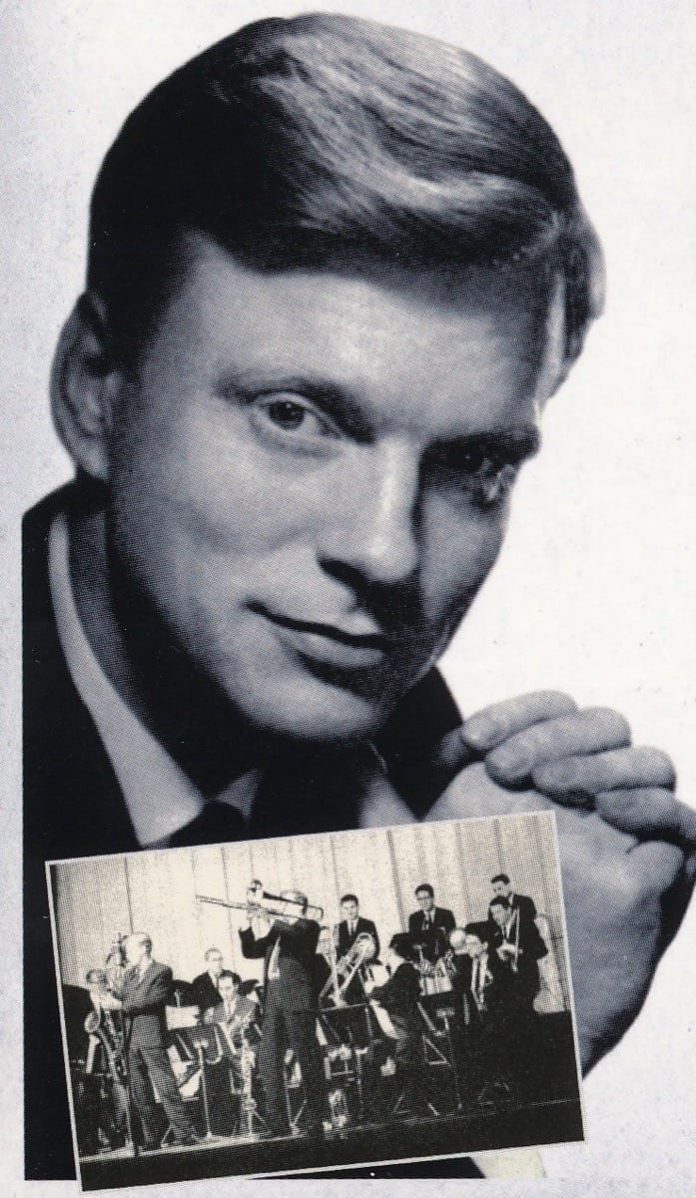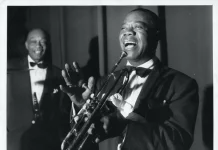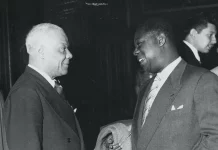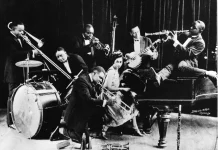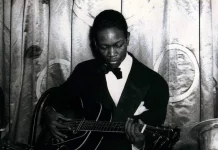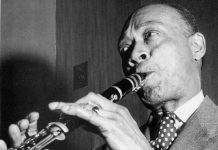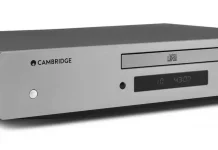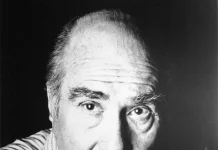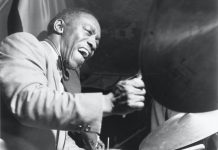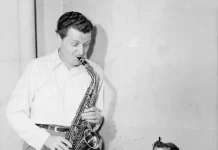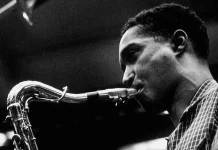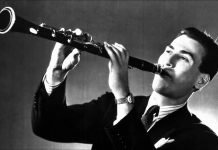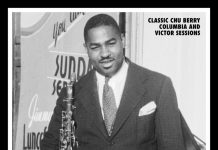The great years of the Gerry Mulligan Concert Band were from 1960-62 – quite a short period for an inspired band that figures large in jazz history. It was not long after Chet Baker left Mulligan’s landmark quartet that valve trombonist Bob Brookmeyer replaced him. Historians of the period have been careless and it’s not possible to date either event precisely.
The relationship with Bob was to prove one of he most important of Gerry’s life and, despite a divergence in their methods of improvising, the music the two made together blended in the most constructive and imaginative manner.
The two had first encountered each other in Los Angeles some time in 1953 when Bob was playing a 13-week season at Zardi’s with the Stan Getz Quintet. Mulligan’s quartet with Chet Baker was at the Haig at the same time, and Brookmeyer and Getz went to hear them each night after finishing work. They soon started playing informally together and Mulligan, Getz and Brookmeyer agreed that the result was the best band they’d ever played with. Bob recalled the main problem with the virtual band. Who’s going to be the bandleader? So it never happened.
The Concert Band, as defined by its name, was just for listening. “The bands of the 30s were much more fleet. I decided to try to take smaller band and go back to the fleetness that I liked in an ensemble. It had its roots in the Miles Davis band of 1949. I wanted the same clarity of sound and interplay of lines that I had in the smaller groups”, said Mulligan. “I wanted to use just a few men for the bulk of the solo work, so that they would be heard enough for the audience to become familiar with their styles.” The fully formed 14-piece kept the light feel of a small group and, with the absence of a piano, was able to float in a way unique to such a large band.
Bob toured Europe and played in Gerry’s quartet at the Paris Jazz Festival in May 1954. It’s likely that by that time he had been working with Gerry for some months, no doubt drawing on his experience in the similar small group in which he’d played for Getz since 1952.
Two things in particular made Bob an ideal partner for Gerry. Like Mulligan, Bob was a gifted arranger and, unlike Gerry, Bob had no ambitions at that time to be a leader. When they came together the root of the quartet and then that of the Concert Band was created.
Bob supervised much of the band rehearsal because Gerry was busy elsewhere. For the same reason Mulligan couldn’t write as much for the band as he would have liked to, and so he co-opted arrangers to do it. As well as the ideal Brookmeyer, he used Al Cohn, Bill Holman and Johnny Mandel – a team that could only have been improved by the addition of Ellington and Strayhorn!
Restraint was its key element. Without the piano the two-piece rhythm was able to drive on the band unobtrusively. With a second baritone Mulligan could keep the band sound whilst he soloed, and the arrangements for the band kept the brass in check, very tight and with no loud section shouting. The solos fell mainly to Mulligan, Brookmeyer (so obviously in his element with this new platform), Zoot Sims and Clark Terry. Clark was in the band for its most important years, 1960-62, but somehow missed being on its first album and because of studio work didn’t make the band’s European tour.
The five albums recorded for Verve in those two years made up Mosaic MD4-221, issued in 2003 but alas long gone.
But there was an important corollary in a double-CD Paris Olympia concert recorded on 19 November 1960 by Europe 1 radio (Europe 1 710382/3). This was as good as any of the Verve collections and pretty well recorded. It has just been released, complete for the first time, on a three-CD set (Frémeaux FA 5796) with an extra three numbers plus a brief Utter Chaos and the addition of a full CD by the quartet with Brookmeyer.
Here’s the line-up: Gerry Mulligan (bar, p); Don Ferrara, Conte Candoli, Nick Travis (t); Bob Brookmeyer (vtb, p); Willie Dennis, Allen Raph (tb); Gene Quill, Bob Donovan (as); Zoot Sims, Jim Reider (ts); Gene Allen (bar, cl); Buddy Clark (b); Mel Lewis (d).
The first of the extras is You Took Advantage Of Me from the first concert. It has a rampaging Brookmeyer for almost three minutes and this version is better than the issued second house one, also here. Both are stuffed with Bob’s half-valving. He later told me that he didn’t like this practice and that it embarrassed him to hear it. Mulligan, who follows each of Bob’s solos, is eloquent as usual. There follows 18 Carrots For Rabbit, a fast piece filled with driving alto from Quill and a couple of lovely-toned bass solos from the admirable Clark. Mel Lewis’s backing is typically hidden but effective. Then comes Darn That Dream, the last of the new tracks, a self-indulgent Mulligan piano feature – in the first part he sounds like Kenton. Brookmeyer solos, feet on the ground, squeezed valves, subdued backing from Gerry and at the end a chorus nicely scored for the band.
The repertoire for the European tour was the same each night. Additionally Norman Granz, who organised the tour, had set up warm-up gigs in Santa Monica and at Newport beforehand, so the numbers were well run-in.
Mulligan has said that the Paris concert was spoiled for the band because of a group of “very noisy youngsters who began complaining even before we started to play”.
“I never did find out just what it was that they were against, but whatever it was they succeeded in making a rather dismal evening for everybody.” Fortunately there’s no sign of this on these well-recorded CDs.
When I talked to him about the band’s output, Bob Brookmeyer was as he usually was, over-modest. Gerry had a singularity of purpose and was in no doubt about the significance of the music. The two men were driving a band that was certainly one of the most original of its decade, and its music remains as fresh as ever to this day.
The quartet on the third disc, recorded in Paris two years later, hits with ease the never-fluctuating quality of Mulligan music, and the replacement of Clark and Lewis by the superb Bill Crow and Gus Johnson is predictably perfect.
Perfect? As near-perfect a CD set as you’ll find this year.

